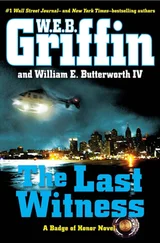John Matthews - The Last Witness
Здесь есть возможность читать онлайн «John Matthews - The Last Witness» весь текст электронной книги совершенно бесплатно (целиком полную версию без сокращений). В некоторых случаях можно слушать аудио, скачать через торрент в формате fb2 и присутствует краткое содержание. Жанр: Триллер, на английском языке. Описание произведения, (предисловие) а так же отзывы посетителей доступны на портале библиотеки ЛибКат.
- Название:The Last Witness
- Автор:
- Жанр:
- Год:неизвестен
- ISBN:нет данных
- Рейтинг книги:5 / 5. Голосов: 1
-
Избранное:Добавить в избранное
- Отзывы:
-
Ваша оценка:
- 100
- 1
- 2
- 3
- 4
- 5
The Last Witness: краткое содержание, описание и аннотация
Предлагаем к чтению аннотацию, описание, краткое содержание или предисловие (зависит от того, что написал сам автор книги «The Last Witness»). Если вы не нашли необходимую информацию о книге — напишите в комментариях, мы постараемся отыскать её.
The Last Witness — читать онлайн бесплатно полную книгу (весь текст) целиком
Ниже представлен текст книги, разбитый по страницам. Система сохранения места последней прочитанной страницы, позволяет с удобством читать онлайн бесплатно книгу «The Last Witness», без необходимости каждый раз заново искать на чём Вы остановились. Поставьте закладку, и сможете в любой момент перейти на страницу, на которой закончили чтение.
Интервал:
Закладка:
Jean-Paul nodded. They’d pushed hard the last six months to get a stronger inside track at the RCMP. But their only contact was in Vice, and Chenouda’s group handling the investigation against them was tight-knit and secretive. Little of any value leaked out.
‘And what’s Roman’s view?’ Larsen asked.
‘I only spoke to him briefly on the phone, but he’s pretty sure Cacchione’s behind it.’ Jean-Paul tilted his head and shrugged. ‘Apparently, after the mess with Leduc, Savard confided in him that he was concerned that as a friend of Leduc’s, Cacchione might worry that Savard had been privy to secrets about Cacchione’s drugs network. That wasn’t the case, but Savard feared that Cacchione might believe it to be so.’
Larsen asked: ‘Do you think Cacchione might have been also responsible for Steve Tremblay’s death?’
‘Maybe,’ Jean-Paul conceded. Until now, they’d had no reason to believe that the death of the car driver that night was anything other than what it appeared: a boating accident. Now he was beginning to wonder.
Georges looked down for a second. Was it just family allegiances and respect for Jean-Paul that stopped anyone airing the other possible option: that with the increasing RCMP investigation, Roman might be keen to bury all traces to that fateful night. Or was it simply because of what he knew about that night that nobody else at this table knew? He could hardly scorn those allegiances, when it was exactly that which had made him shy away from telling all to Jean-Paul in the first place. Yet now that one lie — or at least not telling all the truth — was becoming dangerously compounded.
Jean-Paul misread his look of concern. ‘If it’s Cacchione’s intention to target others from that night, you and Roman will have to be extra vigilant. I’ll talk to Roman about stepping up security.’
Great, thought Georges. So now his future health would rest in Roman’s hands, yet he’d cut himself off from being able to tell anyone why he didn’t feel entirely comfortable about that. ‘Okay,’ he said meekly.
‘This whole affair with Leduc has been messy, and unfortunately could get messier still,’ Jean-Paul said with resignation. ‘But I’m determined that it not be allowed to drag us back or in any way affect our new direction. I think the two of you appreciate more than most how important that is to me.’
As Jean-Paul came onto discussing with Jon Larsen their most recent problem of fresh licensing pressure with two clubs — which they feared was all part of the general RCMP Lacaille-family purge — Georges suddenly felt strangely remote, cut-off from their conversation; the stranger perhaps he’d always been. The weight and grandeur of the room pressed in as it had done at that first meeting with Jean-Paul and Jon Larsen: the rococo-edged ceilings and pillars, the rich red drapes tied with gold brocade, the high-backed Louis XIV chairs, the collection of family photos on a long side table with priceless ormolu clocks interspersed — an altar to time-family continuum; the ornate cherub ‘Houdon’ statue at the far end, who apparently had also made statues of Voltaire and George Washington. Struck as he’d first walked in the room with the feeling that Jean-Paul might see himself as a modern-day Napoleon.
But over those first few meetings, Georges started to see the other side of Jean-Paul: a warm, caring family man with noble — if venturesome and foolish — hopes and aims. An image that was keenly massaged by Jon Larsen in heart-to-hearts straight after those meetings: ‘No doubt you’ve read and heard all the dark stories — rumoured or otherwise. But don’t worry — I’ll be first to make sure that Jean-Paul keeps to his promise that all that side of the Lacaille family is now history. Jean-Paul’s one of the fairest men I’ve worked for, and I’ve worked for a few in my time. Otherwise I just wouldn’t have stayed around this long.’
A hard-bitten corporate lawyer for thirteen years before joining Jean-Paul, Jon Larsen perhaps saw in Georges a kindred spirit: a fellow exile from the business world. But whether through that or not, he did find himself bonding closer with Larsen than anyone else in the extended Lacaille family. Now late-fifties with a strong resemblance to Mr Magoo — except that what little ring of hair Larsen had left was kept brush-cut short — all too often Georges found they shared the same thoughts and views. Over the past three years, they’d swapped many truths and confidences. Except one.
But it wasn’t Larsen’s pep talks that had finally convinced him to join the fold; nor Jean-Paul’s firm compliance with his request that all the money be cleaned before he started work with it; nor their offer of almost double his existing $280,000 p.a. earnings with Banque du Quebec, with additional share bonuses in the Lacaille’s many businesses.
What finally decided him was that Jean-Paul’s quest touched his heart. After their fifth or sixth meeting, Georges didn’t remember now, Jean-Paul sat him down with a large brandy and told him the family background that had finally forged in his heart and soul this new direction: of how Pascal’s death had destroyed their father; of him and Pascal playing together as children and Pascal in his teenage years talking about becoming a musician or writer; of how Jean-Paul himself had strongly related to that, because secretly he’d dreamed of becoming an architect or designer before the family business sucked him in. Jean-Paul had then pointed to the picture of his son Raphael on the side table. ‘He’s only twelve now, and perhaps his dreams aren’t fully formed yet and he’s still talking about being a train driver or an astronaut — but I don’t want him to end up the same as Pascal.’
In that moment, Georges hadn’t seen a crime don, but the frightened teenager who’d buried his dreams, then later his younger brother, both in the name of familial duty — yet now was frantically grappling with whether he’d be able to turn back the tide before it claimed another generation.
Georges phoned back within the week to tell Jean-Paul that he’d join him. And from that point the quest rapidly became a crusade: not just for Jean-Paul to prove to himself that it could be done, nor the challenge to Georges as a money-man to be able to match the sort of high returns previously notched up from crime — but because their aims had started to attract keen outside interest. Four other leading crime families — most notable among them Jean-Paul’s close friends and past crime allies, the Giacomelli family of Chicago — were eager to see Jean-Paul fair well: after all, if he succeeded it could provide a useful blueprint for them to follow. Others were more sceptical, saying that it had never been done before simply because it couldn’t be done. Lacaille was trying for the impossible.
Suddenly their quest had become a cause celebre. Bets were being taken each side on whether they won or lost. And it hit Georges then just how monumental the stakes were: succeed, and he not only provided the salvation Jean-Paul so badly craved, but they also might show the path for countless crime families to follow; fail, and it was back to the dark ages.
And now Roman’s rash action that one night compounded by his own lie could bring down the whole deck of cards. The crushing weight of it all was almost too much to bear.
Georges laid his right hand flat and firm on the refractory table to stop it from trembling. His attention was pulled sharply back by the mention of Roman.
‘…We could go around in circles speculating how this whole mess might have been avoided if Roman had just grappled Leduc’s gun away or pushed his gun arm to one side. But it could just as easily have backfired.’ Jean-Paul turned one palm towards Georges, his eyes softening. ‘Either yourself or Roman could have been shot. Regardless of the unfortunate repercussions now, it was self-defence. So we have to stick together on this.’
Читать дальшеИнтервал:
Закладка:
Похожие книги на «The Last Witness»
Представляем Вашему вниманию похожие книги на «The Last Witness» списком для выбора. Мы отобрали схожую по названию и смыслу литературу в надежде предоставить читателям больше вариантов отыскать новые, интересные, ещё непрочитанные произведения.
Обсуждение, отзывы о книге «The Last Witness» и просто собственные мнения читателей. Оставьте ваши комментарии, напишите, что Вы думаете о произведении, его смысле или главных героях. Укажите что конкретно понравилось, а что нет, и почему Вы так считаете.












